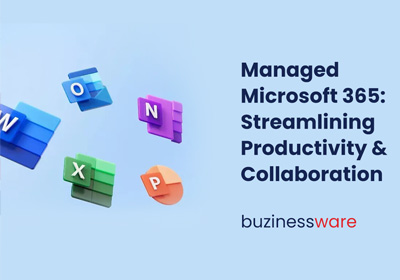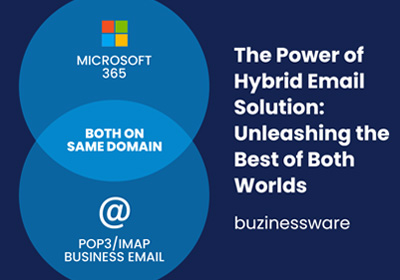
Managed Microsoft 365: Streamlining Productivity and Collaboration
Managed Microsoft 365, previously known as Office 365, is a comprehensive suite of cloud-based productivity and collaboration tools designed to empower organizations of all sizes to enhance their work processes, communication, and collaboration. With an array of applications and services, Managed Microsoft 365 offers businesses a unified platform for efficient document management, communication, and teamwork. This integrated solution has become a staple in modern workplaces, providing seamless access to various tools that facilitate productivity and promote collaboration.
Key Components and Features:
-
Microsoft Word, Excel, PowerPoint:
The core applications within Managed Microsoft 365 provide familiar tools for creating and editing documents, spreadsheets, and presentations. These applications offer advanced features for formatting, sharing, and real-time collaboration. -
Microsoft Outlook:
Managed Microsoft 365 includes Outlook for email communication and calendaring. With features like shared calendars, scheduling, and integrated contacts, teams can easily stay organized and connected. -
Microsoft Teams:
An integral part of Managed Microsoft 365, Teams serves as a hub for collaboration. It offers chat, video conferencing, file sharing, and integration with other Microsoft and third-party applications. Teams enables seamless communication and project management, bringing remote teams closer together. -
OneDrive and SharePoint:
These platforms provide cloud-based file storage and sharing solutions. OneDrive focuses on personal file storage and access, while SharePoint offers team sites and intranet capabilities for centralized document management and collaboration. -
Microsoft OneNote:
OneNote allows users to capture and organize notes, ideas, and information in a digital notebook format. It supports multimedia content, web clipping, and easy sharing. -
Microsoft Planner:
Planner is a task management tool that helps teams organize work, assign tasks, set due dates, and track progress. It provides a visual overview of projects and their status. -
Microsoft Forms:
Forms enables users to create surveys, quizzes, and polls, making it easy to gather feedback and data from colleagues, clients, or customers. -
Security and Compliance:
Managed Microsoft 365 includes built-in security features such as advanced threat protection, data loss prevention, and encryption. Compliance tools help organizations meet regulatory requirements for data protection.
Benefits of Managed Microsoft 365:
Enhanced
Collaboration:
The integrated suite fosters seamless teamwork by providing a central platform for communication, file sharing, and project management.
Scalability:
Managed Microsoft 365 offers flexible subscription plans, allowing businesses to scale their services based on their needs and workforce size.
Cloud
Accessibility:
As a cloud-based solution, Managed Microsoft 365 allows users to access their documents and tools from anywhere with an internet connection, promoting remote work and mobility.
Regular
Updates:
Subscribers benefit from regular software updates, ensuring they have access to the latest features, security patches, and improvements.
Cost-Efficiency:
The subscription-based model reduces the upfront costs of purchasing software licenses and maintaining on-premises infrastructure.
Simplified
IT Management:
Managed Microsoft 365 shifts the responsibility of software maintenance and updates to Microsoft, allowing IT teams to focus on other strategic tasks.
Managed Microsoft 365 is a powerful suite that continues to evolve and adapt to the changing needs of modern businesses. It empowers organizations to streamline their operations, enhance collaboration, and embrace the digital workplace, ultimately contributing to increased efficiency, productivity, and growth.


